You are using an out of date browser. It may not display this or other websites correctly.
You should upgrade or use an alternative browser.
You should upgrade or use an alternative browser.
Articles
There are a wide range of books available for learning technical analysis, covering topics like chart patterns, crowd psychology, and even trading system development. While many of these books provide outdated or irrelevant information, there are several books that have become timeless masterpieces when it comes to mastering the art of trading.
In this article, we will look at seven books on technical analysis to help traders and investors better understand the subject and use as possible strategies in their own trading.
Getting Started in Technical Analysis:- Jack Schwager
This book is an excellent starting point for novice traders that covers every major topic in technical analysis. In addition to covering chart patterns and...
One of the questions I'm most frequently asked has to do with what's needed to begin investing. Some folks want to know how much money they need to begin. Others have a strong desire to buy a few stocks they heard about. And then there are people who have spent a long time thinking about getting underway, but never had the courage to take any steps in that direction.
The process of getting started in investing is simple and straightforward. It's a matter of filling out some basic forms, having funds available to move into the investment account, deciding what to buy, and then turning that decision into action. The logistics are easy. What's more difficult is developing the discipline to create and follow an asset allocation plan that...
Risk tolerance is a topic that is often discussed, but rarely defined. It is not unusual to read a trade recommendation discussing alternatives or options based on different risk tolerances. But how does an individual investor determine his or her risk tolerance? How can understanding this concept help investors in diversifying their portfolios? Read on as we delve into this concept.
Risk Tolerance by Time frame
An often seen cliché is that of what we'll refer to as "age-based" risk tolerance. It is conventional wisdom that a younger investor has a long-term time horizon in terms of the need for investments and can take more risk. Following this logic, an older individual has a short investment horizon, especially once that individual...
Exchange-traded funds (ETFs) are ideal for beginning investors because of their many benefits likes low expense ratios, abundant liquidity, wide range of investment choices, diversification, low investment threshold, and so on.These features also make ETFs perfect vehicles for various trading and investment strategies used by new traders and investors. Here are seven of the best ETF trading strategies for beginners presented in no particular order.
1) Dollar-Cost Averaging
We begin with the most basic strategy: dollar-cost averaging. Dollar-cost averaging is the technique of buying a certain fixed-dollar amount of an asset on a regular schedule, regardless of the changing cost of the asset. Beginner investors are typically young...
If you start any type of business you first have to come up with the initial seed capital to get the business off the ground. This comes with the understanding that there’s always risk because there’s never a guarantee that the business will prosper. With any traditional business we will always be subjected to the vagaries of the economy, litigation, and growing competition in whatever field we decide to venture into. This makes starting a business for many people somewhat challenging.
One of the advantages of using trading as a vehicle for generating income is that once a skill is learned, all of the aforementioned challenges that a traditional business faces no longer apply. If you learn how to trade properly, any market condition...
Thanks to online discount brokerages, anyone with an Internet connection and a bank account can be up and trading stocks within a week. This ease of access is great because it encourages more people to explore investing for themselves, rather than depending solely on mutual funds or money managers. However, there are some common mistakes that first time investors have to be aware of before they try picking stocks like Buffett or shorting like Soros.
1) Jumping in Head First
The basics of investing are quite simple in theory – buy low and sell high. In practice, however, you have to know what “low” and “high” really mean. What is “high” to the seller is considered “low” (enough) to the buyer in any transaction, so you can see how...
Traders generally buy and sell securities more frequently and hold positions for much shorter periods than investors. Such frequent trading and shorter holding periods can result in mistakes that can wipe out a new trader's investing capital quickly. Here are the 10 worst mistakes made by beginner traders:
Letting losses mount
One of the defining characteristics of successful traders is their ability to take a small loss quickly if a trade is not working out and move on to the next trade idea. Unsuccessful traders, on the other hand, get paralyzed if a trade goes against them. Rather than taking quick action to cap a loss, they may to hold on to a losing position in the hope that the trade will eventually work out. In addition to tying...
Based on experience, here are my thoughts on what makes a successful trader.
I have been teaching beginners to trade for many years, and over all those years I have found that things do not change very much, with one exception – the technology improves. When I started out, never in my wildest dreams could I envisage trading from a mobile phone or an iPad. However, it can be confusing to the newcomer. I’m sure if I was starting my trading adventure right now I would be faced with mind boggling choices and really wouldn’t have a clue where to start. When I started all those years ago, there were very few places you could go to get a solid foundation in the basics of trading.
Now, you are spoilt for choice. There are literally hundreds...
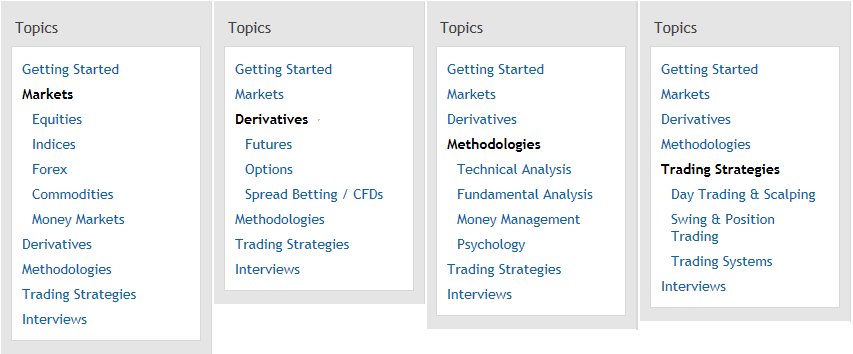
The Articles section of T2W is a veritable repository of trading knowledge, experience and ideas. It’s compiled with one aim in mind: to help you achieve your trading objectives. At the time of writing (March 2012), there are 468 articles in total which, between them, have received well in excess of 4.6 million views - and counting! There are contributions from some of the best known experts in their field, including: Jake Bernstein, John Bollinger, Linda Bradford Raschke, Dr Alexander Elder, Steve Nison, William O'Neil, Martin J. Pring and Brett N. Steenbarger - to name but a few.
However, unless you’ve been a T2W member since 2005 and diligently read all of the contributions as and when they were published – you’ve got a mountain of...
Is it possible to trade with a full time job? Most certainly yes, but challenges will arise for those that want to devote their limited time to two full time professions. In this article, I am going to address the debate over whether or not you can be a successful trader with a full time job or not. I will also provide 5 tips for making the most out of your trading while still working your full time job.
To start out this article, I'll give a little background on my personal experiences in trading whilst working a full time job. When I first got involved in trading, I was a full time college student working a full time job who also wanted to become a full time trader. It doesn't take a mathematician to figure out that there's 3...
This article is aimed at all those new to trading and we look at the basics of what technical analysis actually is.
What is Technical Analysis?
Technical analysis is the study of price data and statistical indicators that are formed by market activity. Market activity illustrates the flow of supply and demand. This supply and demand is a reflection of beliefs and opinions translated into human behaviour and specifically, herd mentality. Therefore, technical analysts would argue, price patterns and indicator signals can be categorised based on historical data with a reasonably high expectation that they will occur again at some point in the future. This argument is based on the theory that human behaviour is innate and, although it...
There are really no "secrets" about how to invest successfully. There are lots of good ideas out there in plain sight - in books, newsletters, magazines and more - and you can acquire them cheaply.
The problem is there are also lots of really bad ideas about investing out there too. Most people can't tell the difference between the two. This makes it hard to create a winning investment strategy. It would be like trying to make apple pie without knowing a ripe apple from a rotten one. That's problem No. 1.
The second difficulty is that even when you find the genuine article - a timeless bit of investing wisdom - it is not something you can use to great effect in isolation. In other words, the "secret" to creating a successful investing...
In this article we take a look at what the IRS requires for you to be called a trader and what forms are required to be completed with your yearly tax returns.
Just because you call yourself a securities trader doesn't make you one in the eyes of the Internal Revenue Service. In fact, Uncle Sam is predisposed to consider you merely an investor, and thus deny you more favorable tax status, unless you meet a number of tests that are frustratingly open to interpretation.
That's right: the tax code contains no actual definition of trader status. Instead, the IRS has issued guidelines that the courts have further delineated by case law, most of which denied taxpayer appeals. What we're left with is a blurred image, like a photograph of a...
The six stages of a developing trader are looked at below.
Stage One: The Clueless Trader
This is the first stage when you enter trading. You may have picked up a book on technical analysis somewhere, heard of a day trader making millions, or got lucky in an earlier stock investment. After all, how hard can it be? The money sounds appealing and the freedom to be independent sounds attractive.
I don't mean to shatter anybody's dream but those who succeed in trading are the minority! Approximately 90-95% traders lose money. This is the cold hard facts. In the first stage, every trader is optimistic. You open a direct access brokerage account and the sound of Level II, ask/bid, and market makers make trading sound like hi-tech video...
I was recently asked about stops and different types of market orders. They were good questions and they reiterated to me the fact that I work with people that range from seasoned trading professionals to those testing the futures trading waters for the first time.
One thing I always like to point out to the less-experienced traders: There are no "dumb" questions and there is no shame in being inexperienced. Every single futures trader that ever walked the face of the earth has been inexperienced at one point.
This section on types of market orders, including stops, may be a "refresher" feature for the more experienced traders, and will likely be a more valuable feature for the traders newer to this fascinating field.
Market Order...
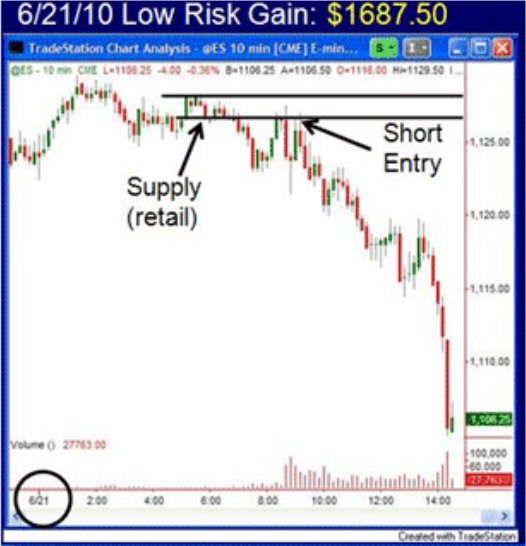
I started my career on the floor of the Chicago Mercantile Exchange facilitating institutional order flow. This means taking large buy and sell orders from banks, institutions, money managers, hedge funds, and more, paying close attention to market price, and then making sure those orders get executed and filled at the proper prices. I started in the currency quadrant and was specifically responsible for the Japanese Yen, Canadian Dollar, British Pound, Deutsch Mark, and Swiss Franc markets. The highest volume and most volatile market of this group back then was the Japanese Yen, so that's where much of my focus was.
One of the main reasons for the high volume and volatility was the Bank of Japan (BOJ) as they were very active in this...
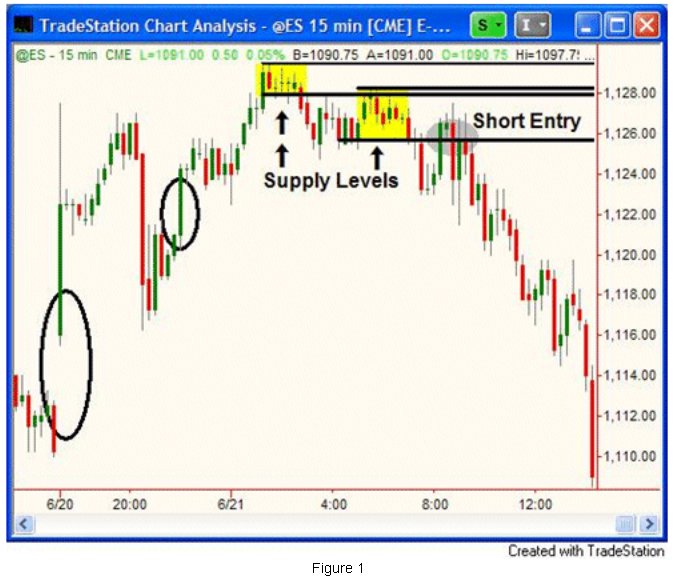
Before starting my career at the Chicago Mercantile Exchange, I did two things and really two things only. I played ice hockey and went to school where the focus of my studies was Biology and Genetics. I know what you're thinking, how boring... Well, I actually was and am still fascinated with the study of life so I really enjoyed those days. Around every corner of Biology, Chemistry, Genetics, and so on is another mathematical equation. After diving into this field, I quickly realized that though there were so many equations, the underlying goal of most of these equations was to quantify the forces of "change", "action", or "energy." So, one could argue that all these equations were really different variations of the same thing. For my...
Whether you want to be a fundamental trader or technical trader, you need to have a sound understanding for how markets work. As a price action trader, economics major and trading educator, I fully understand how markets work, but do you?
There are tens of thousands of trading websites and thousands of different trading methods being sold on them, most of which never really explain to you, the trader, exactly how or why they work. To me this is just shady business practices from these companies, and is more times than not due to the fact that these methods either don't work or the person in charge of marketing these methods doesn't know how they work. I am writing this article wearing the shoes not only of a full time trader and...
The Wrong Questions:
Whenever I get emails from newer traders, they consist of questions like "How Can I Make A Lot Of Money?" and "What Method Can I Use To Make A Lot Of Money?" and "How Should I Know When To Buy And When To Sell To Make The Most Money?".
Just by reading the questions asked in the emails I can tell the experience level of the trader. I usually don't even give a straight answer to these emails since these are the types of traders who are destined to fail in the first place. Remember that about 90-95% of traders end up losing money, and that is simply because new traders are getting involved in trading for all the wrong reasons. My typical response is something along the lines of "You need to learn what to ask and how...
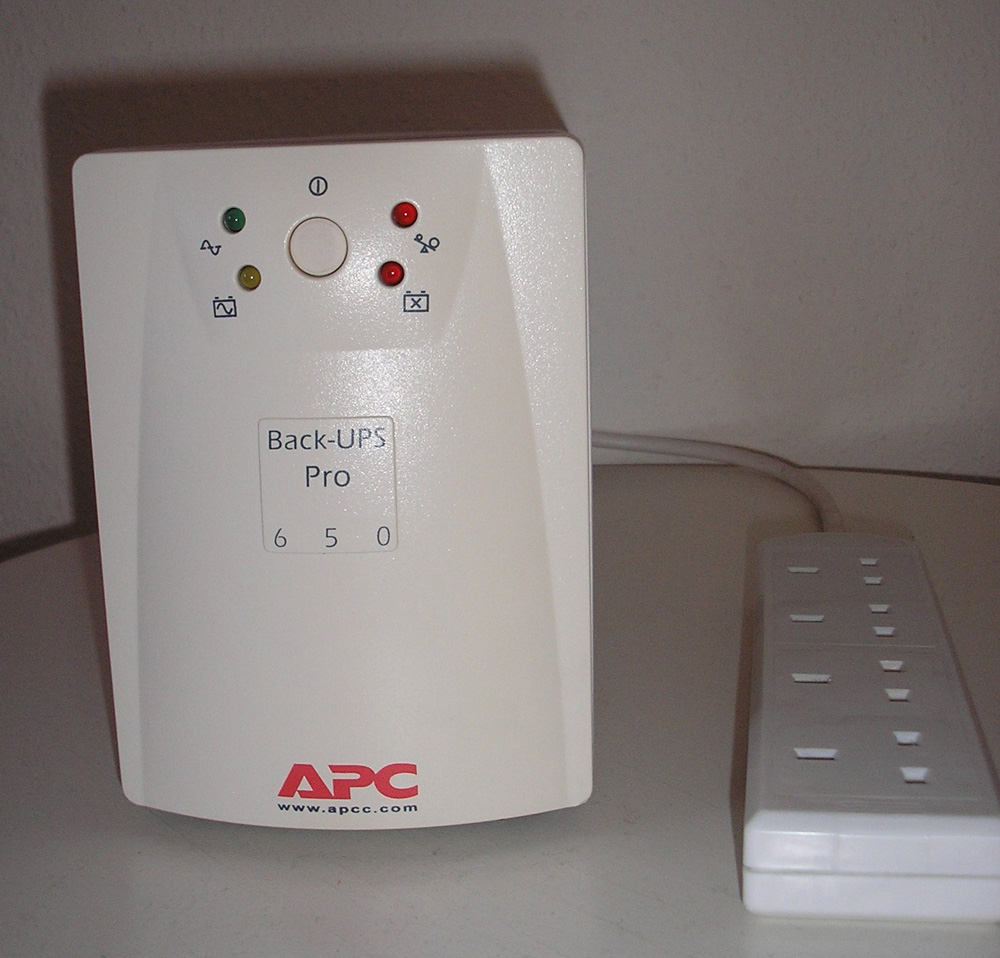
If you were to ask most retail day-traders what is the most important factor for them when trading, there would probably be many different answers given. For me the most important and overriding consideration is the ability to close an open trade. For most people this does not go beyond setting a stop loss whether fixed or trailing.
However, there are many possible scenarios that could result in large losses being incurred if not catered for and in this article I will be discussing a number of these and how to overcome them.
Issue 1 - Loss of Power
A sudden loss of electrical power could cause a much bigger problem than you thought possible. If you are trading using a desktop computer and the power fails you could be in an open trade...
Each year as we prepared for these holidays, we planned for all those we had bought gifts for and careful thought was put into each person's gift:
* We planned where we will shop for the gift
* Our trips to the stores were planned to eliminate too much back-tracking
* Consideration for the type of wrapping paper and bows was given
* After all this, we then had to plan on how we would get the gifts to the people and still allow for the time to get it done
Wow, seems like a lot of work? Believe it or not, most traders will plan this type of event out on paper so that there will be no mistakes. Come that special holiday morning, they will be sitting back and enjoying the holiday because everything on the checklist was done just like...
Through my years of trading, one thing I have found is that one strategy does not fit all. We all have different risk tolerances and monetary goals. One of my goals in each E-mini Futures class I teach is to show the students a strategy and have them take it home and use it as a foundational starting point for defining their own strategy. My style is to follow the trend and enter on pullbacks. You could call this style Intraday Swing trading. This works for me because it fits my personality, patience and discipline. I understand that trading is a business dealing in probabilities and that it takes a series of trades to make a trader, not just one or two trades. However, with that said, not everybody trades like me. Of course, that is a...
Every year at New Year we hear of people making resolutions of all varieties. Have you ever noticed that these resolutions are usually made without any serious thought or planning involved? This is the difference between a resolution and setting goals.
Goal setting is:
A focused plan based on proven methods to achieve desired results
A predetermined set of rules and regulations
We often hear about having a trading and or business plan to succeed in trading. Then comes the education needed to be successful. Before long we are at the screens trading for a living. Day in and day out we follow all our rules and can actually see our account size growing. We are enjoying our trading career for all that it has to offer. Then, one day you...
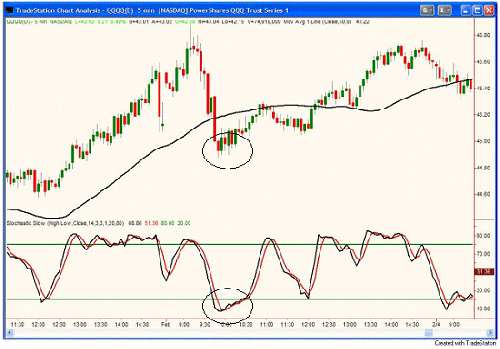
Advances in technology have been the driving force behind the change and growth in the world of market speculation. One of the many recipients of faster and stronger technology is system trading as high speed computers now help retail and institutional traders develop systems, crunch numbers, and back test hypothetical results in seconds. In the world of professional money management, I have seen plenty of trading systems. Ironically, most don't seem to work and of the ones that do, they typically work for a bit and then fail. Being on the education side of the industry as well, I have seen hundreds of automated systems yet, I can only say that I have seen less than a hand full actually produce a consistent profit year after year. I...
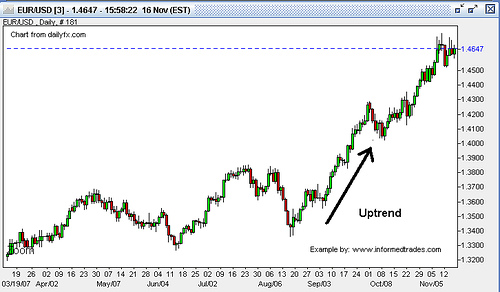
Most consider the father of technical analysis (the science of forecasting market movements based on price patterns) to be Charles Dow, the founder of Dow Jones and Company which publishes the Wall Street Journal. Around 1900 he wrote a series of papers which looked at the way prices of the Dow Jones Industrial Average and the Dow Jones Transportation Index moved. After analyzing the Indexes he outlined his belief that markets tend to move in similar ways over time. These papers, which were expanded on by other traders in the years that followed, became known as "Dow Theory".
Although Dow Theory was written over 100 years ago most of its points are still relevant today. Dow focused on stock indexes in his writings, but the basic...
Traders spend most of their time researching setups for trade entry, using fundamental analysis, chart patterns, signals from technical indicators, or some combination of these.
Yes, no doubt about it, finding entries is vitally important, because the entry is the foundation upon which a trade is built. However, if finding good entries is the most difficult thing, finding good exits is the most emotionally challenging part of the trading process!
Winning or losing, deciding on the exact time to close your trade can drive you nuts.
Common exits occur when traders get stopped out at a stop loss level, close the trade into high volume spikes, or attain predefined targets.
All trades should have a stop loss in place. Some traders hold a...
In order to be a successful trader - and not fall into the trap of so many - it is important to take good advice and remember that, sometimes, others do know best! Here are the Top 10 tips for successful trading. Follow them closely (or at least to an extent) and you should stand a good chance of becoming an accomplished spread bettor.
ALWAYS stay in control
Winners are always in control; both mentally and emotionally.
Losers aren't. Losers are sometimes guided by emotions - This will lead to you making bad decisions!
'Plan the trade, trade the plan'. Always stick to the original plan. Deviations will invariably lead to an error.
Take responsibility for results
Winners are can sometimes lose! But most of the time they win and...
The title of this article alone is likely to raise the hairs on the back of many necks. The thought of pushing away concepts and ideas used for decades may sound ludicrous to you, but allow me to elaborate.
Old and proven ideas should never be pushed aside. Rather, the old ideas that have not proven effective and have prevented many from progressing towards a positive goal, these need to be shed. And there are plenty of them.
Some of these old ideas are that the futures and commodity markets cannot be forecasted because the patterns are random. Other old ideas are that you cannot make a success at trading unless you know the fundamentals of the market you wish to trade. And there is the old ideas that to make a success you must depend...
Paper trading is widely discussed regarding its merits, and whether it is of value to a trader as they try to make the transition to real money trader. One viewpoint is that since paper trading is not real, the profits are meaningless, and are no indication of real money profitability. An opposite viewpoint would state that paper trading is an important step in the trader's learning progression, and regardless of whether it is real, if the trader cannot "properly" paper trade, then they will not be able to real money trade.
I began trading in early 1995, with the intentions of becoming an options trader; my first trading education was through an oex options teaching service. Besides options training, the service included "tape"...
